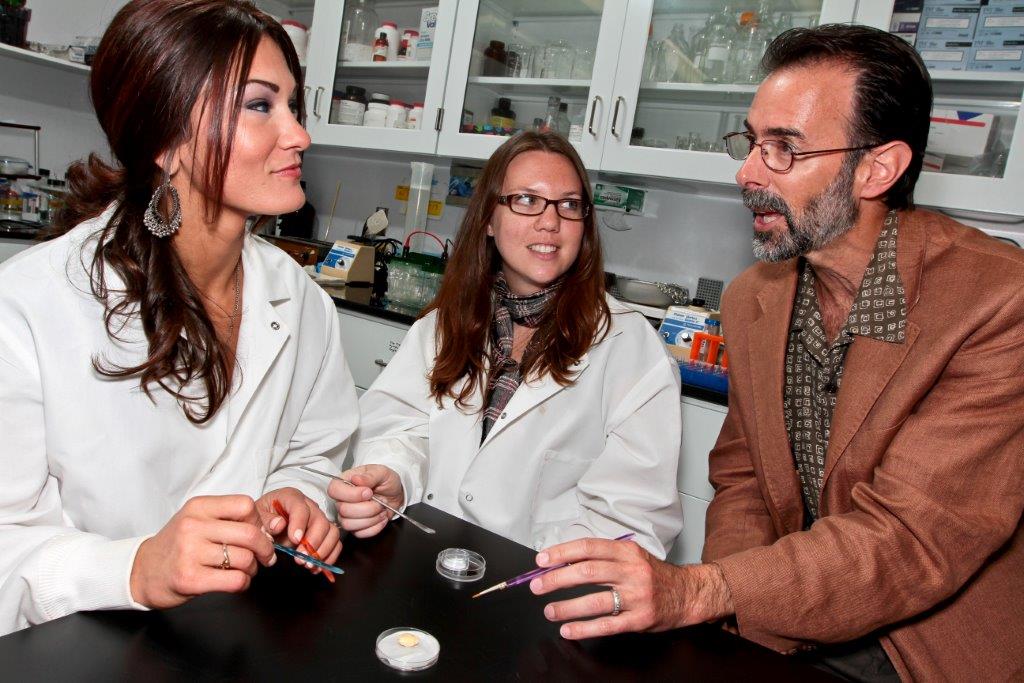
Faculty Recruit Brings Research Dollars, Recognition to UNC Pembroke
-- By Barry Teater, NCBiotech Writer
 |
| UNCP Prof. Ben Bahr, Ph.D., enjoys helping to develop young scientists such as 2010 NCBiotech undergraduate fellow Joanna Cooper (left) and 2011 fellow Rebecca Howell. -- UNCP photo |
When Ben Bahr, Ph.D., was recruited to the University of North Carolina at Pembroke in 2009 as the inaugural William C. Friday Distinguished Chair and Professor of Molecular Biology and Biochemistry, much was expected.
The newly created position was charged with advancing biotechnology research and education at the university and spurring economic development in southeastern North Carolina.
In the six years since his arrival from the University of Connecticut, Bahr has by all accounts earned a robust return on the state’s investment.
- He is aiming to test a compound he discovered that may help clear the tangle of toxic proteins in the brain thought to contribute to Alzheimer’s disease.
- For that lysosomal modulatory compound, he and a colleague filed UNCP’s first patent application. Variations of the compound someday may help aging Baby Boomers reduce their risk of developing protein-accumulation diseases including Alzheimer’s, Parkinson’s, Huntington’s and ALS.
- He has attracted and mentored more than 70 bright undergraduate students, many who have gone on to graduate school, medical school and jobs in the state’s biotechnology industry. And he has mentored several graduate students at UNCP.
- He won a national Mentor Award from the Council on Undergraduate Research for being a role model for biology students and other mentors of undergraduate research.
- He received the James E. Holshouser Jr. Award for Excellence in Public Service, recognizing the distinguished work of a faculty member in the UNC system.
- And in September his laboratory was awarded its third U.S. Department of Defense (DoD) research grant in a little more than a year. The grant, for nearly $600,000 over three years, will fund a study to understand neurotoxins and the brain. It follows two DoD grants totaling $675,000 to study traumatic brain injury, including lab upgrades and the hiring of a research associate.
Bahr, who holds a doctorate in chemistry from the University of California-Santa Barbara, is an internationally recognized expert on age-related neuro-degenerative disorders including Alzheimer’s, traumatic brain injury and seizures. He was recruited to UNCP with the help of a $198,000 grant from the North Caroilina Biotechnology Center, one of more than 50 outstanding faculty recruits funded by NCBiotech grants to universities throughout the state.
Research grants increase value of NCBiotech support
His grant-writing prowess with DoD is welcomed by NCBiotech, which sponsors a Bio Defense Program designed to attract more federal research investment into North Carolina from DoD and other federal security agencies.
With the latest DoD grant, Bahr’s lab, located in UNCP’s Biotechnology Center at the COMtech Business Park in Pembroke, will hire its second post-doctoral research associate to ramp up its newest research project.
“The Army is interested in the effects of toxins on the brain, specifically anticholinesterase nerve agents,” Bahr says. “This enzyme controls neuronal signaling that is vital for the heart, lung and brain function, and the Army wants to know in particular what happens to the brains of people who are exposed to low doses of these chemicals.”
Because weaponized forms of the nerve agents are believed to have been used in several terrorism attacks, “this is important research for the Army,” Bahr says. “Some of the symptoms of exposure to low doses of anticholinesterases are headaches, memory loss and psychiatric effects.”
Focus on nerve gas effects on brain cells
The lab will expose brain slices taken from rats to low doses of anticholinesterase and analyze the tissue using its laser-scanning confocal microscopy system.
The lab will also look at glial cells, which comprise 60 percent of the brain’s mass and help maintain the normal functioning of neurons.
“The study of glia during responses to neurotoxicity is a rather new field, and there is not enough knowledge of their function,” Bahr says. “We want to see how glial cells are involved in reacting to and recovering from exposure to toxins.”
In both of its DoD-funded projects, traumatic brain injury and neurotoxins, “we plan to study if there is an increase in the risk for Alzheimer-type cellular changes that can be experimentally induced in the lab,” Bahr says.
Bahr is grateful for NCBiotech’s support of his lab’s work to study and enhance awareness of Alzheimer’s disease, stroke and traumatic brain injury; to help identify novel treatment avenues; and to help fight for a dementia-friendly society.
“A most gratifying achievement is when I train the young mind of a college student and they make a research discovery that no one has seen before,” Bahr says. “These are the young scientists that will grow their careers with ever-increasing advances in biotechnology. Lab support from NCBiotech lets me show students they don’t have to be overwhelmed with the complexity of the brain and its remarkable connectivity that makes up 500,000 gigabytes of memory. I tell them the same scientists that got Apollo 11 on the moon started with the same overwhelmed feeling when they first stepped in a lab.”
